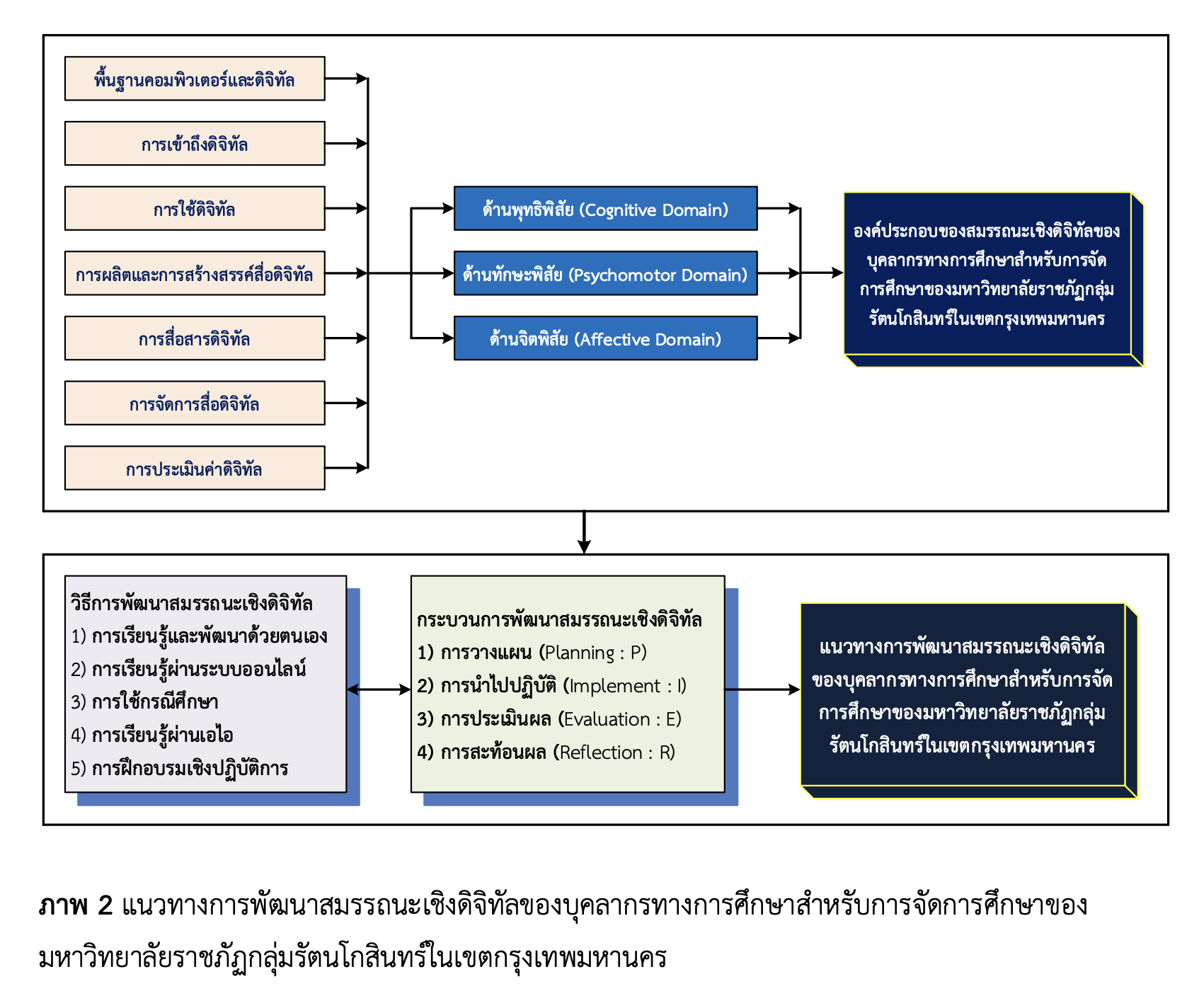Approaches to Developing Digital Competency among Educational Personnel for Educational Management at Rattanakosin Rajabhat University Group in Bangkok
Main Article Content
Abstract
This research aimed to study the characteristics and components of digital competency and to identify approaches for developing the digital competency of educational personnel for educational management at Rattanakosin Rajabhat University Group in Bangkok. A mixed-methods research approach was employed. The research process consisted of four stages: 1) Studying the characteristics through document analysis and in-depth interviews with 10 administrators. 2) Analyzing the components through questionnaires administered to a sample of 558 educational personnel: administrators, faculty members, and staff, selected using multi-stage random sampling. 3) Verifying the components using data triangulation. 4) Presenting guidelines for development through a focus group discussion with nine higher education administration experts, purposively selected. The research instruments included structured interview forms, questionnaires, and focus group discussion guides. Qualitative data were analyzed using descriptive content analysis, while quantitative data were analyzed using exploratory component analysis, including indicators. The research findings revealed that the characteristics of digital competence of educational personnel for the management of education at the Rattanakosin Rajabhat University Group in Bangkok comprised three aspects: 1) Digital Literacy, 2) Digital Tool Utilization/Problem Solving with Digital Tools, and 3) Adaptive Digital Transformation. The main components included: 1) Cognitive Domain, 2) Psychomotor Domain, and 3) Affective Domain. Three development approaches were identified: 1) Development Methods, 2) Development Processes, and 3) Key Success Factors in Development.
Downloads
Article Details

This work is licensed under a Creative Commons Attribution-NonCommercial-NoDerivatives 4.0 International License.
แนวคิดและข้อเสนอแนะที่นำเสนอในบทความของวารสารการบริหารและความเป็นผู้นำทางการศึกษา มหาวิทยาลัยรามคำแหง เป็นแนวคิดที่มาจากผู้เขียน หากมีความผิดพลาดใด ๆ ผู้เขียนเป็นผู้รับผิดชอบแต่เพียงผู้เดียว
ทั้งนี้ บรรณาธิการ กองบรรณาธิการ และคณะกรรมการหน่วยจัดทำวารสารฯ จะไม่ก้าวก่ายความมั่นคงในหลักการตามความคิดของผู้เขียน
ดังนั้น บรรณาธิการ กองบรรณาธิการ คณะกรรมการหน่วยจัดทำวารสาร และมหาวิทยาลัย จะไม่รับผิดชอบใด ๆ จากผลที่เกิดขึ้นจากการนำเสนอแนวคิด และข้อเสนอแนะของผู้แต่งที่เผยแพร่ในวารสารฯ
References
Agila-Palacios, M. V., Muñoz-Repiso, A. G.-V., and Ramírez-Montoya, M. S. (2022). Influence of Active Methodologies: Projects and Cases in the Development of Digital Competences with Mobile Devices. Journal of Applied Research in Higher Education, 14(3), 1007-1020.
Anwar, S., and Saraih, U. N. (2024). Digital Leadership in the Digital Era of Education: Enhancing Knowledge Sharing and Emotional Intelligence. International Journal of Educational Management, 38(6), 1581-1611.
Carvalho, A., Alves, H., and Leitão, J. (2022). What Research Tells Us about Leadership Styles, Digital Transformation, and Performance in State Higher Education?. International Journal of Educational Management, 36(2), 218-232.
Lee, J. J., and Meng, J. (2021). Digital Competencies in Communication Management: A Conceptual Framework of Readiness for Industry 4.0 for Communication Professionals in the Workplace. Journal of Communication Management, 25(4), 417-436.
Ministry of Higher Education, Science, Research and Innovation. (2019). Higher Education Act B.E. 2019. Bangkok: Shipping and Parcel Printing Houses. [In Thai].
Ministry of Higher Education, Science, Research and Innovation. (2024). Action Plan to Drive and Promote the Utilization of Science, Research, and Innovation at the Regional Level for the Year 2024-2027. Retrieved from http://clinictech.ops.go.th/online/cmo/site_blog_show.asp?id=41. [In Thai].
National Information Technology Committee. (2019). The Essential Digital Competencies for Undergraduate Students in Thai Higher Education Institutions. Retrieved from http://https://www.incits.org/. [In Thai].
Parkatti, A., Saari, T., Tammelin, M., and Villi, M. (2022). Framing Digital Competence in Media Work – The Case of Finland. International Journal of Sociology and Social Policy, 42(13/14), 15-29.
Phakamach, P. (2023). Educational Innovation: Elements and Mechanisms for the Development of Thai Educational Institutions Towards Internationalization. Journal of Education and Innovative Learning, 3(2), 161-180. [In Thai].
Phakamach, P., Panjarattanakorn, D., and Onsampant, S. (2023). Conceptualization and Development of Digital Leadership to Drive Corporate Digital Transformation for Sustainable Success. International Journal of Educational Communications and Technology, 3(2), 27-39.
Phakamach, P., Senarith, P., and Wachirawongpaisarn, S. (2022a). ICT Systems Development Guidelines for Educational Innovation Management of Rajamangala University of Technology in Thailand. Journal of Education and Innovative Learning, 2(2), 109-130. [In Thai].
Phakamach, P., Senarith, P., and Wachirawongpaisarn, S. (2022b). The Metaverse in Education: The Future of Immersive Teaching & Learning. RICE Journal of Creative Entrepreneurship and Management, 3(2), 75-88.
Reddy, P., Sharma, B., Chaudhary, K., Lolohea, B., and Tamath, R. (2022). Information Literacy: A Desideratum of the 21st Century. Online Information Review, 46(3), 441-463.
Saib, M. O., Rajkoomar, M., Naicker, N., and Olugbara, C. T. (2023). Digital Pedagogies for Librarians in Higher Education: A Systematic Review of the Literature. Information Discovery and Delivery, 51(1), 13-25
Schiuma, G., Schettini, E., Santarsiero, F., and Carlucci, D. (2022). The Transformative Leadership Compass: Six Competencies for Digital Transformation Entrepreneurship. International Journal of Entrepreneurial Behavior & Research, 28(5), 1273-1291.
Yadav, A. K. S. (2022). The Essential Skills and Competencies of LIS Professionals in the Digital Edge: Alumni Perspectives Survey. Global Knowledge, Memory and Communication, 71(8/9), 837-856.
Zhan, H., Cheng, K. M., Wijaya, L., and Zhang, S. (2024). Investigating the Mediating Role of Self-Efficacy Between Digital Leadership Capability, Intercultural Competence, and Employability Among Working Undergraduates. Higher Education, Skills and Work-Based Learning, 14(4), 796-820.


